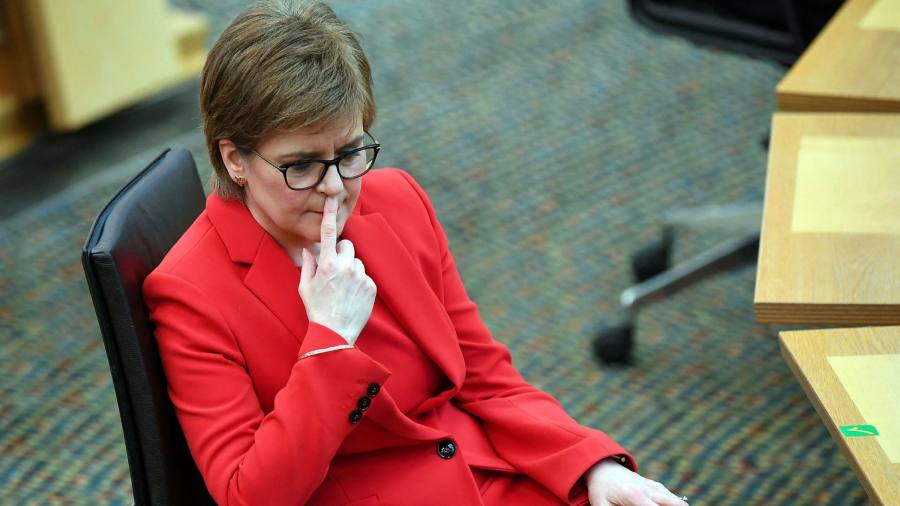[ad_1]
A majority of members of a Scottish parliamentary inquiry on Thursday concluded that first minister Nicola Sturgeon misled them over her response to sexual harassment complaints against her predecessor Alex Salmond.
The 5-4 vote by the inquiry committee piles new pressure on Sturgeon just weeks before May 6 elections for the parliament in Edinburgh that her Scottish National party hopes will provide a platform for a second referendum on independence from the UK.
The result of the vote — one of a large number of decisions by the committee that will be published in its report next Tuesday — was leaked to Sky News while members were still in session on Thursday evening.
A person familiar with the committee’s deliberations confirmed that members had concluded Sturgeon gave them “an inaccurate account†of a 2018 meeting with Salmond at which the complaints against him were discussed.
The majority agreed Sturgeon had “misled the committee on this matter†and that this was a “potential breach†of the Scottish ministerial code.
The code says that ministers who knowingly mislead parliament will be expected to offer their resignation. However, a potentially more decisive ruling on whether Sturgeon breached it will come from a separate investigation by the first minister’s independent adviser on the code, former Irish prosecutor James Hamilton QC. Hamilton is expected to report in the next week.
Sturgeon on Thursday dismissed news of the committee vote as an unsurprising and “very partisan†leak, saying people should wait for the inquiry’s final report and for the results of Hamilton’s investigation.
“I stand by all of the evidence I gave to the committee, all eight hours-worth of evidence,†she said. “What’s been clear is the opposition members of this committee made their minds up about me before I uttered a single word of evidence.â€
The opposition Scottish Conservatives, who have repeatedly called for Sturgeon to resign, said the final report would only be “confirmation of what we already knowâ€.
“Nicola Sturgeon has not told the public the truth about what she knew and when,†said Douglas Ross, Scottish Conservative leader. “We cannot set a precedent that a first minister of Scotland can mislead the Scottish parliament and get away with it.â€
The extraordinary rift between Sturgeon and Salmond, the two dominant figures in Scottish politics for the last decade and a half, threatens to undermine the SNP’s chances of securing a parliamentary majority in May.
However, polls suggest the party is still firmly on track to be the largest party and Sturgeon has insisted it should be voters who have the final verdict on her handling of the complaints against her former mentor.
In January 2019, the Scottish government was forced to concede in court that its investigation into harassment complaints against Salmond by two civil servants had been unlawful because it was “procedurally unfair†and “tainted by apparent biasâ€. At a criminal trial last year, the former first minister was acquitted of all 13 sexual offence charges against him.
The parliamentary committee’s roughly 200-page report due next week will give its view on numerous aspects of the government’s handling of the complaints — many of them potentially highly damaging for Sturgeon and permanent secretary Leslie Evans, Scotland’s top civil servant.
The conclusion leaked on Thursday centres on Sturgeon’s account in her written submission to the committee last year, in which she said she had made clear to Salmond at a meeting on April 2 2018 that she would not seek to intervene in the complaints process.
Salmond told the committee that Sturgeon had actually agreed to intervene at his request, though she had later decided not to do so. The former first minister’s account was supported by Duncan Hamilton, a former SNP member of the Scottish parliament and advocate who accompanied him to the meeting.
Challenged on the point at her own appearance to the committee this month, Sturgeon said she might not have been as “blunt†as she should have been to her former mentor, and she had had no intention of intervening.
Thursday’s highly unusual partial leak of its conclusions is likely to fuel criticism of the parliamentary committee, which has often divided along party lines in votes on how to proceed with its inquiry.
[ad_2]
Source link






